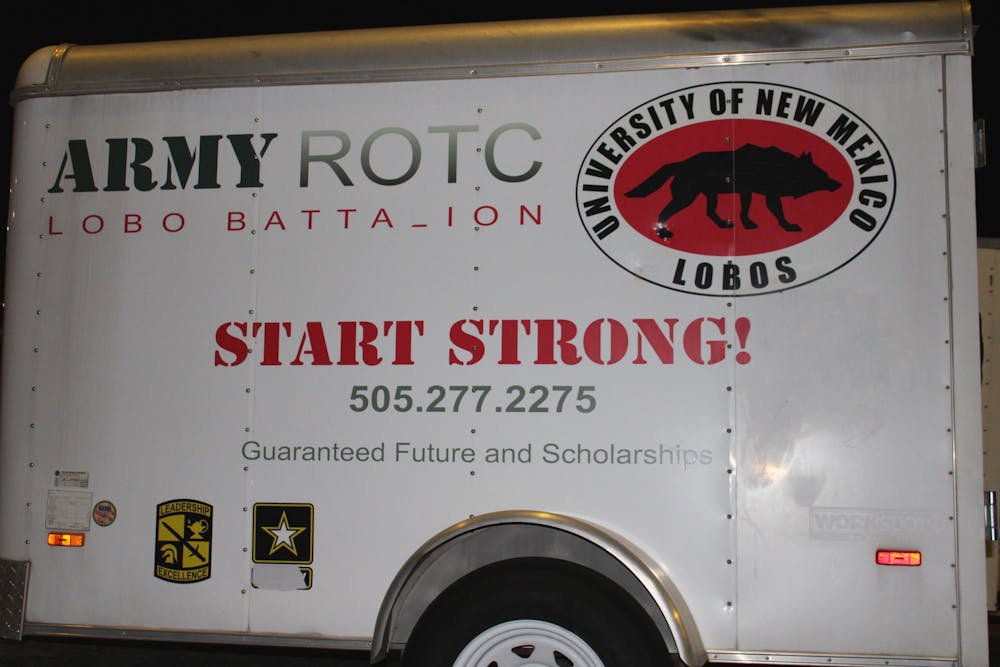This semester, the University of New Mexico ROTC program has four cadets graduating with undergraduate degrees: Victoria Anderson, Daniela Ortega, Steven Canales and Zachary Ninneman. Anderson, Ortega and Canales will all be leaving the program this semester, while Ninneman will be entering his master's program and has three more semesters of ROTC left.
Anderson discussed how graduating from the program this semester created a bond between her, Ortega and Canales.
“We have to go in periodically for (physical training) tests or for late hikes, or we have to go get inspections on our uniforms and stuff like that. That's definitely been kind of fun … I don't go to all the regular ROTC stuff (anymore). But I go to a lot of our own stuff that's getting ready for commissioning,” Anderson said.
Commissioning — the transition from cadet to officer — grants the graduating members of the ROTC the official rank of second lieutenant in their selected branch, kickstarting their specialized officer training and post-graduation military career, according to Michigan Technical University.
For Ortega, becoming close to those in the program was an inevitability due to the amount of time they spend with one another, whether that be through training or assisting each other through personal problems.
“That's what happens in the Army, you become really close to people, and you build memories … (like) being encouraged to eat the (Meals Ready to Eat) … That's kind of something that they encouraged me (with). It's one of my best memories because I wouldn't have thought I would eat that stuff,” Ortega said.
Graduating in the fall instead of last May has been a different experience for the cadets. Anderson has seen a difference in how the younger students in the ROTC program treat her and her fellow graduates.
“Everyone else who's in the program is like, ‘oh my gosh, you're going to commission,’ and so everyone else in the program starts calling you like ma'am or sir. And that's super weird,” Anderson said. “So all three of us joke about that — how people (say) like, ‘oh, hi, ma'am.’ And it's like, no, no, no, don't call me ma'am yet. It's not time.”
Though she sometimes wished she had graduated last May with the rest of her class, Ortega has found the advantages in knowing those who have graduated prior.
“(The May graduates are) already ahead and stuff. So I mean, the only good thing about it is if I have any questions about going active duty or any questions about any schools and stuff like that, I can always refer to them and ask them how they're doing,” Ortega said.
Meeting people currently serving piqued Anderson’s interest in ROTC during her freshman year when she first heard of the National Guard from a professor. She had always loved the military, having a family connection to it, but she disliked the idea of moving around a lot. The National Guard offered an alternative.
“In the Guard, you might have to drill in different cities, but I'll always be in New Mexico, and I love that,” Anderson said. “I like being able to serve but also being able to have more of a scheduled life.”
Get content from The Daily Lobo delivered to your inbox
Ortega learned several things in ROTC, but she credits her time there with helping her grow both her leadership skills as well as as a person.
“I've learned a lot about leadership (and) about myself. It's just a good time, being able to teach the younger ones, growing from being a freshman to a senior and being the leader, and showing them things you would have liked to learn when you were a freshman,” Ortega said.
Elizabeth Secor is a beat reporter for the Daily Lobo. She can be contacted at culture@dailylobo.com or on Twitter @esecor2003
Elizabeth Secor is a freelance reporter for the Daily Lobo. She can be contacted on Twitter @esecor2003






